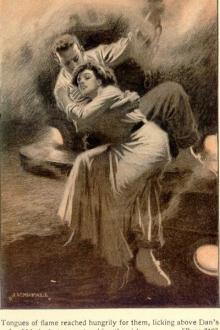The Lighthouse, Robert Michael Ballantyne [summer reading list .txt] 📗

- Author: Robert Michael Ballantyne
Book online «The Lighthouse, Robert Michael Ballantyne [summer reading list .txt] 📗». Author Robert Michael Ballantyne
It turned out to be a party of gentlemen from Leith, who had run down the firth to see the works. The weather was fine, and the sea calm, but these yachters had yet to learn that fine weather and a calm sea do not necessarily imply easy or safe landing at the Bell Rock! They did not know that the _swell_ which had succeeded a recent gale was heavier than it appeared to be at a distance; and, worst of all, they did not know, or they did not care to remember, that "there is a time for all things," and that the time for landing at the Bell Rock is limited.
Seeing that the place was covered with workmen, the strangers lowered their little boat and rowed towards them.
"They're mad," said Logan, who, with a group of the men, watched the motions of their would-be visitors.
"No," observed Joe Dumsby; "they are brave, but hignorant."
"_Faix_, they won't be ignorant long!" cried Ned O'Connor, as the little boat approached the rock, propelled by two active young rowers in Guernsey shirts, white trousers, and straw hats. "You're stout, lads, both of ye, an' purty good hands at the oar, _for gintlemen_; but av ye wos as strong as Samson it would puzzle ye to stem these breakers, so ye better go back."
The yachters did not hear the advice, and they would not have taken it if they had heard it. They rowed straight up towards the landing-place, and, so far, showed themselves expert selectors of the right channel; but they soon came within the influence of the seas, which burst on the rock and sent up jets of spray to leeward.
These jets had seemed very pretty and harmless when viewed from the deck of the yacht, but they were found on a nearer approach to be quite able, and, we might almost add, not unwilling, to toss up the boat like a ball, and throw it and its occupants head over heels into the air.
But the rowers, like most men of their class, were not easily cowed. They watched their opportunity--allowed the waves to meet and rush on, and then pulled into the midst of the foam, in the hope of crossing to the shelter of the rock before the approach of the next wave.
Heedless of a warning cry from Ned O'Connor, whose anxiety began to make him very uneasy, the amateur sailors strained every nerve to pull through, while their companion who sat at the helm in the stern of the boat seemed to urge them on to redoubled exertions. Of course their efforts were in vain. The next billow caught the boat on its foaming crest, and raised it high in the air. For one moment the wave rose between the boat and the men on the rock, and hid her from view, causing Ned to exclaim, with a genuine groan, "Arrah! they's gone!"
But they were not; the boat's head had been carefully kept to the sea, and, although she had been swept back a considerable way, and nearly half-filled with water, she was still afloat.
The chief engineer now hailed the gentlemen, and advised them to return and remain on board their vessel until the state of the tide would permit him to send a proper boat for them.
In the meantime, however, a large boat from the floating light, pretty deeply laden with lime, cement, and sand, approached, when the strangers, with a view to avoid giving trouble, took their passage in her to the rock. The accession of three passengers to a boat, already in a lumbered state, put her completely out of trim, and, as it unluckily happened, the man who steered her on this occasion was not in the habit of attending the rock, and was not sufficiently aware of the run of the sea at the entrance of the eastern creek.
Instead, therefore, of keeping close to the small rock called _Johnny Gray_, he gave it, as Ruby expressed it, "a wide berth." A heavy sea struck the boat, drove her to leeward, and, the oars getting entangled among the rocks and seaweed, she became unmanageable. The next sea threw her on a ledge, and, instantly leaving her, she canted seaward upon her gunwale, throwing her crew and part of her cargo into the water.
All this was the work of a few seconds. The men had scarce time to realise their danger ere they found themselves down under the water; and when they rose gasping to the surface, it was to behold the next wave towering over them, ready to fall on their heads. When it fell it scattered crew, cargo, and boat in all directions.
Some clung to the gunwale of the boat, others to the seaweed, and some to the thwarts and oars which floated about, and which quickly carried them out of the creek to a considerable distance from the spot where the accident happened.
The instant the boat was overturned, Ruby darted towards one of the rock boats which lay near to the spot where the party of workmen who manned it had landed that morning. Wilson, the landing-master, was at his side in a moment.
"Shove off, lad, and jump in!" cried Wilson.
There was no need to shout for the crew of the boat. The men were already springing into her as she floated off. In a few minutes all the men in the water were rescued, with the exception of one of the strangers, named Strachan.
This gentleman had been swept out to a small insulated rock, where he clung to the seaweed with great resolution, although each returning sea laid him completely under water, and hid him for a second or two from the spectators on the rock. In this situation he remained for ten or twelve minutes; and those who know anything of the force of large waves will understand how severely his strength and courage must have been tried during that time.
When the boat reached the rock the most difficult part was still to perform, as it required the greatest nicety of management to guide her in a rolling sea, so as to prevent her from being carried forcibly against the man whom they sought to save.
"Take the steering-oar, Ruby; you are the best hand at this," said Wilson.
Ruby seized the oar, and, notwithstanding the breach of the seas and the narrowness of the passage, steered the boat close to the rock at the proper moment.
"Starboard, noo, stiddy!" shouted John Watt, who leant suddenly over the bow of the boat and seized poor Strachan by the hair. In another moment he was pulled inboard with the aid of Selkirk's stout arms, and the boat was backed out of danger.
"Now, a cheer, boys!" cried Ruby.
The men did not require urging to this. It burst from them with tremendous energy, and was echoed back by their comrades on the rock, in the midst of whose wild hurrah, Ned O'Connor's voice was distinctly heard to swell from a cheer into a yell of triumph!
The little rock on which this incident occurred was called _Strachan's Ledge_, and it is known by that name at the present day.
------------------------------------------------------------------------
Note 1. It is right to state that this man afterwards obtained a light-keeper's situation from the Board of Commissioners of Northern Lights, who seem to have taken a kindly interest in all their servants, especially those of them who had suffered in the service.
CHAPTER TWENTY FIVE.
THE BELL ROCK IN A FOG--NARROW ESCAPE OF THE SMEATON.
Change of scene is necessary to the healthful working of the human mind; at least, so it is said. Acting upon the assumption that the saying is true, we will do our best in this chapter for the human minds that condescend to peruse these pages, by leaping over a space of time, and by changing at least the character of the scene, if not the locality.
We present the Bell Rock under a new aspect, that of a dense fog and a dead calm.
This is by no means an unusual aspect of things at the Bell Rock, but as we have hitherto dwelt chiefly on storms it may be regarded as new to the reader.
It was a June morning. There had been few breezes and no storms for some weeks past, so that the usual swell of the ocean had gone down, and there were actually no breakers on the rock at low water, and no ruffling of the surface at all at high tide. The tide had, about two hours before, overflowed the rock and driven the men into the beacon house, where, having breakfasted, they were at the time enjoying themselves with pipes and small talk.
The lighthouse had grown considerably by this time. Its unfinished top was more than eighty feet above the foundation; but the fog was so dense that only the lower part of the column could be seen from the beacon, the summit being lost, as it were, in the clouds.
Nevertheless that summit, high though it was, did not yet project beyond the reach of the sea. A proof of this had been given in a very striking manner, some weeks before the period about which we now write, to our friend George Forsyth.
George was a studious man, and fond of reading the Bible critically. He was proof against laughter and ridicule, and was wont sometimes to urge the men into discussions. One of his favourite arguments was somewhat as follows--
"Boys," he was wont to say, "you laugh at me for readin' the Bible carefully. You would not laugh at a schoolboy for reading his books carefully, would you? Yet the learnin' of the way of salvation is of far more consequence to me than book learnin' is to a schoolboy. An astronomer is never laughed at for readin' his books o' geometry an' suchlike day an' night--even to the injury of his health--but what is an astronomer's business to _him_ compared with the concerns of my soul to _me_? Ministers tell me there are certain things I must know and believe if I would be saved--such as the death and resurrection of our Saviour Jesus Christ; and they also point out that the Bible speaks of certain Christians, who did well in refusin' to receive the Gospel at the hands of the apostles, without first enquirin' into these things, to see if they were true. Now, lads, _if_ these things that so many millions believe in, and that _you_ all profess to believe in, are lies, then you may well laugh at me for enquirin' into them; but if they be true, why, I think the devils themselves must be laughing at _you_ for _not_ enquirin' into them!"
Of course, Forsyth found among such a number of intelligent men, some who could argue with him, as well as some who could laugh at him. He also found one or two who sympathised openly, while there were a few who agreed in their hearts, although they did not speak.
Well, it was this tendency to study on





Comments (0)